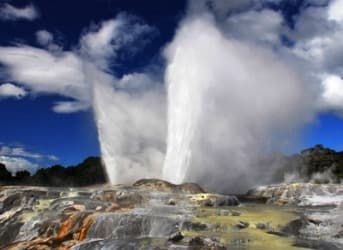Despite the recent victory of Japan’s Liberal Democratic Party, which is pro-nuclear and won a nationwide parliamentary vote on 16 December, issues surrounding the country’s nuclear energy policies will not go away.
In the aftermath of the 11 March 2011 Fukushima Daiichi nuclear crisis, the then ruling Japanese government Democratic Party of Japan took the country's 54 nuclear reactors offline and subsequently restarted two reactors at the Oi nuclear power plant in Fukui Prefecture.
An additional element for broadening the country’s energy options has now come from a country half a world away – Iceland.
During a 5 December speech at the United Nations University (UNU) Headquarters in Tokyo, Icelandic ambassador to Japan, Stefan Larus Stefansson, gave an upbeat assessment of Japan’s enormous untapped geothermal energy potential, citing Iceland’s 85-year history of success in this area as a model.
It was not the first time that Stefansson had spoken on the topic at UNU, as he had also addressed the Japan-Iceland Geothermal Forum in November 2010, four months before the Fukushima Daiichi nuclear catastrophe.
At the 2010 forum Icelandic Minister of Foreign Affairs and External Trade Ossur Skarpheoinsson delivered the keynote address, during which he emphasized the great similarities between Japan and Iceland as geothermal countries, both island nations situated where natural resources could be harnessed to provide for an ever increasing proportion of national energy output. After citing many countries that have untapped geothermal power potential, including those in East Africa, geothermal power could help to bridge their existing energy shortages and provide electricity to those currently without it, declaring, “the age of the geothermal is just beginning.”
Stefansson told his audience that geothermal energy was now the “backbone of the Icelandic economy,” providing for 66 percent of Iceland’s primary energy comes from geothermal resources. Undoubtedly discomfiting some members of his listeners, Stefansson noted that Japan, despite having the world’s third-largest potential for geothermal energy, had built its last geothermal energy plant in 1999, and all government research funding cased four years later, the result of a conscious decision made by the Japanese government to funnel its resources into nuclear energy.
And what party dominated the Japanese government at the time the decision was made?
The Liberal Democratic Party.
Stefansson added that if Japan were to invest in fully realizing its geothermal potential, the nation could replace the electrical output of 25 nuclear reactors.
And Japan hardly lacks the technical expertise necessary for geothermal installations, as they are the world’s largest manufacturers of geothermal turbines, building the equipment that Iceland uses in its geothermal plants. Three Japanese industrial concerns - Toshiba, Mitsubishi Heavy Industries and Fuji Electric have a combined total of over half the world market for geothermal turbines.
But currently geothermal power accounts for a mere 0.3 percent of Japan’s total electricity production.
But even though the pro-nuclear Liberal Democratic Party has been returned to power, Stefansson’s advocacy may have yet an ace up his sleeve. When on 21 August Stefansson presented his credentials as Ambassador of Iceland to Japan to Emperor Akihito, the monarch expressed great interest in the role of Japan related to global warming, asking Stefansson about the impact of Iceland’s geothermal energy industry before asking about trade relations between Iceland and Japan.
ADVERTISEMENT
Iceland’s first overseas geothermal plant opened in El Salvador in 2009, and Iceland’s power industries are eager to export more.
Accordingly, Japan’s nuclear power executives and their LDP buddies must be hoping that the Emperor has a short attention span.
By. John C.K. Daly of Oilprice.com



















On youtube, Dr. Karl Grossman has a video showing the U.S. already perfected geothermal energy decades ago.
It's a mystery why the U.S. doesn't utilize more of it as an energy source, too.
And it's amazing that Japan would even consider nuclear energy after what their country and people have suffered from the meltdowns of March 2011.
Highly recommend 2 sites to follow Japan's nuclear crisis and how it's affected the world:
E N E N E W S (dot) com
E N F O R M A B L E (dot) com
Geothermal is an elaborate approach to diffuse energy, with many potential fail points. It is far better than wind and solar, but not nearly so compact reliable and elegant as new generation nuclear power plants.